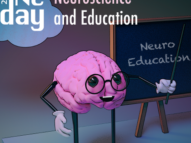This year, the INC Day, organized in partnership with the masters programs BioMedical Engineering – Paris and NeuroParis and the Graduate school Psychological science, is dedicated to the impact of Neuroscience in Education. What are the neuronal bases of learning? Can Neuroscience and Cognitive sciences improve learning methods, or is it a myth? Could they have perverse or deleterious effects? How to address the huge diversity of the audience concerned? Are new digital techniques, based notably on AI and Virtual Reality, really useful? Following the keynote lecture by Mariale Hardiman (Johns Hopkins University, Baltimore), a pioneer in the field, nine other French or foreign researchers will present their latest results.
The INC Day 2023 will take place in the Conference Room R229 of the Saint-Germain-des-Prés, Campus, 45 rue des Saints-Pères, 75006 Paris. Registration to attend the conference on site had to be closed because the maximum capacity (170 persons) was reached. However, it is possible to attend remotely via streaming. The link to be used is http://up5.fr/StreamingINC. Thank you for your understanding.
Program
9:15-9:30 : Welcome Address (C. Meunier)
9:30-10:30 : Keynote Lecture by Mariale Hardiman (Johns Hopkins, University, Baltimore, USA)
Embodied minds, memory, and learning: how the arts support effective education
10:30-12:30 Teaching the Brain (Chairman : C. Meunier)
- Julia Karbach (Landau University, Germany)
Enhancing learning and cognition: Digital assessment and training of neurocognitive functions in the classroom
- C. Shawn Green (University of Wisconsin-Madison, USA
Harnessing the power of videogames for learning
- Grégoire Borst (LaPsyDé, Paris)
From the lab to the classroom: the promises (and pitfalls) of the mind, brain and education approach
12:30-14:00 Lunch break
14:00-16:00 A multi-faceted approach to neuro-education (Chairman : A. Cachia)
- Margarida Romero (Université de la Côte d’Azur, France)
From the neuron to the classroom: a multilevel analysis of creative problem-solving activities
- Franck Ramus (Ecole Normale Supérieure, Paris)
Genetics and education
- Isabelle Peretz (Université de Montréal, Canada )‘
How music sculpts the brain
16 :00-16 :30 Coffee break
16 :30-18 :30 Computer science, new technologies and education (Chairwoman : S. Bernard)
- Jean-Gabriel Ganascia (Sorbonne Université, Paris)
Human intelligence versus machine intelligence: The dilemma of artificial intelligence
- Mikhail Fominykh (Norwegian University of Science and Technology, Trondheim)
Nevrolens: Learning Neuroanatomy with Augmented Reality
- Anne-Laure Le Cunff (King’s College, London)
Researching neurodiversity in digital education: Lessons and open Questions
18:30-18:45 Conclusion
